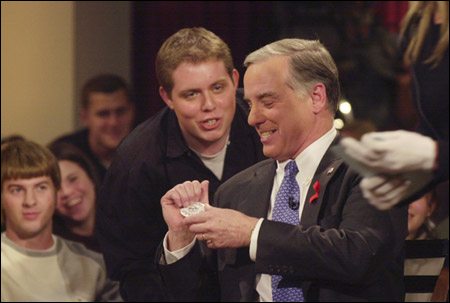Matthews pitches some heat to Dean
From gay marriage to a Vietnam draft deferment, Chris Matthews throws them hard and inside to candidate Dean

This is the sixth in a series of interviews with Democratic presidential candidates.
Democratic candidate former Gov. Howard Dean ably lobbed answers to the staccato of volleys tossed by MSNBC’s “Hardball” host, Chris Matthews in the ongoing Monday night election series at the Kennedy School’s Institute of Politics.
“If we elect you president, when will the geyser go off?” Matthews asked, referring to Dean’s reportedly volatile temper. “I was elected five times as governor, so it couldn’t have gone off too much,” Dean quipped. “But you were elected by a very slim margin the last time,” Matthews retorted. The former Vermont governor explained that he had just signed the controversial civil unions bill giving gay couples equal rights under the law.
“There is no inequality of rights in the state of Vermont,” Dean continued as Matthews demanded to know why he didn’t press for the word “marriage,” a sticking point for many gay couples. “We chose not to do marriage in Vermont … equality under the law is important. How you get there is on a state-by-state basis … . California, for example, has gone the domestic partnership route.”

Dean, who has been vocal about his opposition to the war in Iraq, criticized President Bush. “The president hasn’t served the troops all that well. He sent them [to Iraq] on a series of reasons that turned out not to be true.” Dean noted that Bush doubled the term for reservists and cut some money for veterans. “You can’t expect to have a strong defense without treating people who defend us [well]. Let’s see some money on the table … instead of sending all that money to Ken Lay and Enron with the three billion dollars’ worth of tax cuts.”
Matthews seized the opportunity to press Dean hard on his deferment in the 1970s during the Vietnam War. Dean arrived at his Army physical armed with X-rays and notes from his orthopedist for a four-year old back problem.
“Was this just informative,” Matthews asked, “or were you trying to get out of it?”
“They wouldn’t take me.” Dean said. “I wasn’t trying to dodge the draft.”
As Matthews continued to press him, Dean replied: “No, I was not looking forward to going.”
“Were you looking to be deferred?” asked Matthews.
“Yes,” Dean said.
Kennedy School Dean Joseph S. Nye Jr. asked Dean to elaborate on how he would approach the breakdown in talks around North Korea, which is on the verge of becoming a nuclear state.
“The idea that the most powerful nation of the world is going to be blackmailed because we can’t decide on the size of the table is ludicrous,” said Dean. “We need to work with the Chinese and the Japanese, but we also need to have bilateral talks. We need to let North Korea into the community of nations and in turn they need to disarm.”




